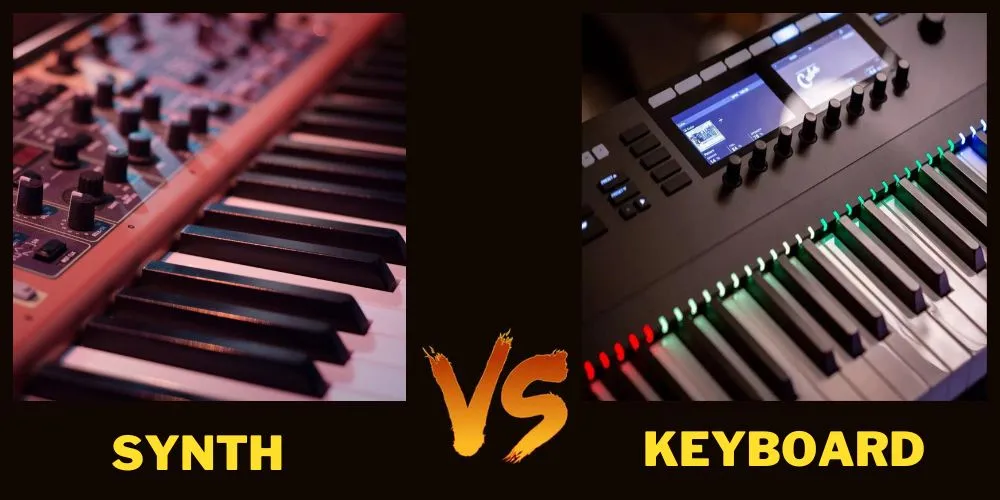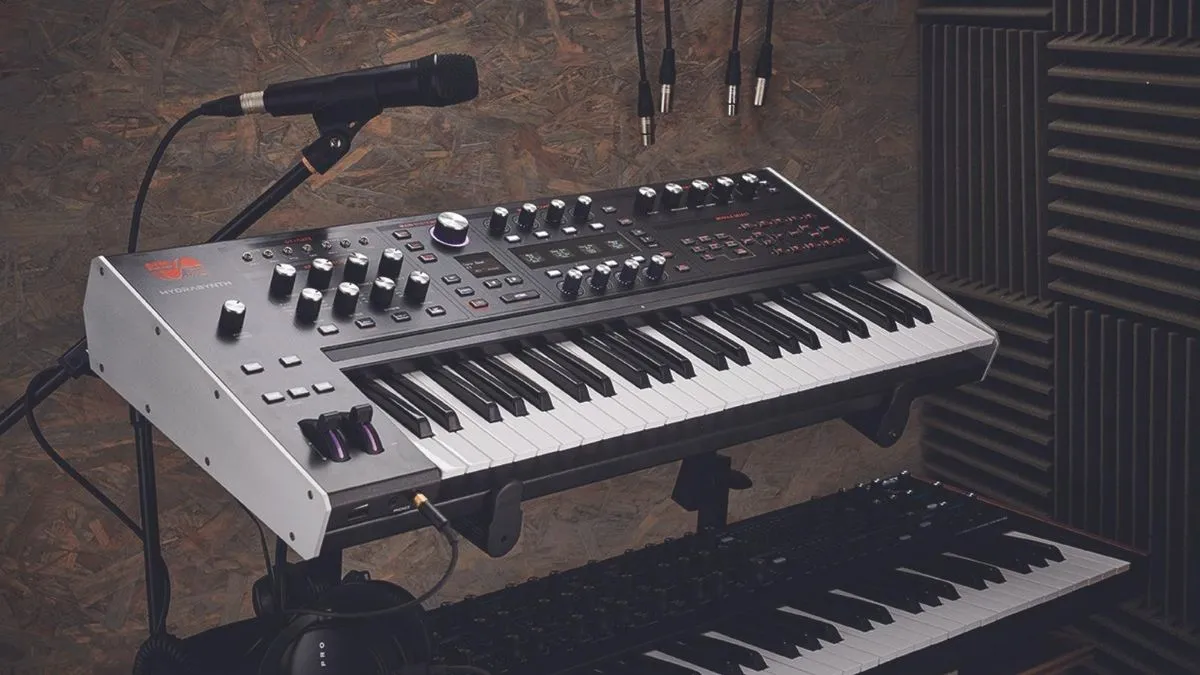When you step into the world of music creation, the instruments you choose become your closest allies.
Synthesizers and keyboards are two staples in the landscape of musical tools, each with its own unique features and capabilities.
Understanding the differences between Synth vs Keyboard is crucial for beginners making informed decisions about their musical journey.

Contents
🎶Defining the Instruments
A synthesizer, often known as a synth, is an electronic instrument that generates sound. Using oscillators, filters, and modulation, synths create and manipulate waves to produce a wide array of sounds, from imitating traditional instruments to crafting entirely novel audio experiences.
Synthesizers are the backbone of electronic music production, allowing for a significant degree of customization. In contrast, keyboards are electronic instruments that resemble a piano in design.
They come loaded with a selection of pre-recorded sounds, enabling musicians to play a variety of instruments from one device. Keyboards often feature tools that assist in learning and music composition, such as built-in metronomes, recording capabilities, and learning modules.
🎶Synth vs Keyboard: An In-Depth Comparison
Sound Generation and Synthesis
Synthesizers create sound in a much more intricate manner. At their heart, they use various forms of synthesis, like subtractive, additive, or frequency modulation (FM), to shape and generate sound waves.
This allows for innovative sound design and musical expression. Meanwhile, keyboards rely on digital samples of actual instruments.
They playback recorded notes from real instruments like pianos, strings, or brass to mimic their sound. This can be particularly useful for musicians who want a wide range of realistic instrument sounds at their disposal.

Functionality and Features
Keyboards equip players with modes and tools that support learning. Features such as lighting keys, step-sequencing, and integrated lesson systems make them ideal for beginners.
Manufacturers design keyboards to be versatile and user-friendly, offering an immediate musical outlet for newcomers. Synthesizers boast a different set of features, focusing on sound customization.
They provide musicians with control over every aspect of sound production, including waveform selection, modulation settings, and filter application. For those interested in electronic music or sound design, these controls are invaluable.
Physical Characteristics
Design and portability often differ between synths and keyboards. Synthesizers typically come in a range of sizes, from modular setups with separate components to compact units ideal for live performance.
Keyboards mimic a traditional piano layout and may come with weighted or unweighted keys. Weighted keys offer a more authentic piano feel, ideal for those practicing for acoustic piano performance.
Uses and Applications
Synthesizers find their place in a wide range of musical applications. From film scoring to electronic dance music, they provide the textures and sounds that define entire genres.
They serve as experimental tools for those who wish to push the boundaries of music. Conversely, keyboards tend to be more rooted in general music practice.
They are the workhorses of music education and are often used by songwriters and performers who need various sounds and effects without requiring in-depth sound manipulation.
Skill Level and Ease of Use
Synthesizers present a steeper learning curve compared to keyboards. The vast array of knobs, sliders, and programming options can be overwhelming for beginners.
However, once mastered, these features allow for a high level of artistry and personal expression.
Keyboards are generally easier for newcomers, providing a straightforward approach to playing music. The learning tools and pre-set sounds help ease the initial challenge of understanding music theory and performance.
Cost Considerations
The price range for both instruments can vary widely. Keyboards can often be found at more modest price points, making them accessible for those on a budget.
Synthesizers, particularly high-end or modular types, can be more of an investment due to their complex sound-shaping abilities.
Accessorizing Your Instrument
Selecting the right accessories can enhance the playability and functionality of both synthesizers and keyboards.
Essential accessories might include stands, amplification systems, and sustain pedals. Synthesizers may require additional components such as patch cables or external sequencers for full potential.
Pros and Cons Summary
Synthesizers offer an unparalleled degree of control over sound. Their capacity for sound innovation and customization is their main advantage.
However, this can also be a limitation for those who prefer simplicity or are just starting their musical adventure.
Keyboards shine in their adaptability and user-friendliness. They provide an array of sounds and aids to facilitate learning and performance. Yet, they lack the deep level of sound personalization that a synthesizer offers.
🎶Performance and Live Use
In live performance settings, synthesizers shine for electronic musicians and experimental artists due to their ability to sculpt unique sounds on the fly, enhancing the dynamism of a live set. They are often compact, making them easily portable for touring artists.

Keyboards, on the other hand, appeal to a broad spectrum of performers, from solo piano players to multi-instrumental bands. They simplify access to a wide array of instrument sounds, essential for covering diverse genres in a single set.
User-friendly interfaces allow for quick adjustments, making keyboards reliable for performers who value versatility and immediacy during a live show.
🎶Frequently Asked Question (FAQs)
Synthesizers generate and manipulate sound waves for unique sounds, while keyboards use digital samples to mimic various instruments.
Yes, though synthesizers have a steeper learning curve, they’re suitable for those interested in sound design and electronic music.
Not all; some keyboards feature weighted keys for a piano-like feel, while others have unweighted keys for lighter touch.
Generally, yes. Synthesizers can be pricier due to their advanced sound manipulation features, but prices vary widely.
Absolutely. Keyboards with weighted keys and realistic sound samples offer a good foundation for transitioning to acoustic piano playing.
Conclusion:
Choosing between a synthesizer and a keyboard boils down to your musical needs and aspirations. For enthusiasts eager to explore the realms of sound creation, a synthesizer might be the perfect partner.
However, if you’re seeking an instrument to practice traditional music or accompany you while learning, a keyboard could be the appropriate starting point.
Whichever path you select, remember that the instrument is a vessel for your creativity—the true music lies within you.
